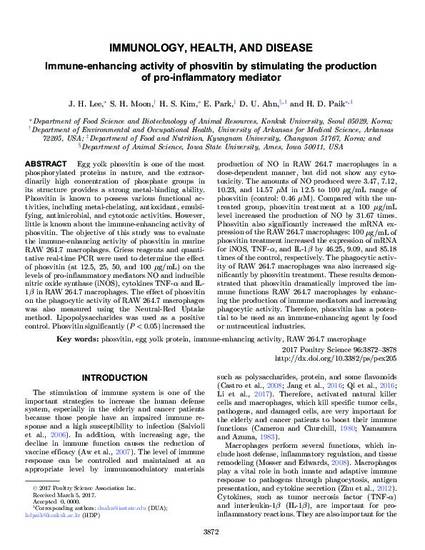
Egg yolk phosvitin is one of the most phosphorylated proteins in nature, and the extraordinarily high concentration of phosphate groups in its structure provides a strong metal-binding ability. Phosvitin is known to possess various functional activities, including metal-chelating, antioxidant, emulsifying, antimicrobial, and cytotoxic activities. However, little is known about the immune-enhancing activity of phosvitin. The objective of this study was to evaluate the immune-enhancing activity of phosvitin in murine RAW 264.7 macrophages. Griess reagents and quantitative real-time PCR were used to determine the effect of phosvitin (at 12.5, 25, 50, and 100 μg/mL) on the levels of pro-inflammatory mediators NO and inducible nitric oxide synthase (iNOS), cytokines TNF-α and IL-1β in RAW 264.7 macrophages. The effect of phosvitin on the phagocytic activity of RAW 264.7 macrophages was also measured using the Neutral-Red Uptake method. Lipopolysaccharides was used as a positive control. Phosvitin significantly (P < 0.05) increased the production of NO in RAW 264.7 macrophages in a dose-dependent manner, but did not show any cytotoxicity. The amounts of NO produced were 3.47, 7.12, 10.23, and 14.57 μM in 12.5 to 100 μg/mL range of phosvitin (control: 0.46 μM). Compared with the untreated group, phosvitin treatment at a 100 μg/mL level increased the production of NO by 31.67 times. Phosvitin also significantly increased the mRNA expression of the RAW 264.7 macrophages: 100 μg/mL of phosvitin treatment increased the expression of mRNA for iNOS, TNF-α, and IL-1β by 46.25, 9.09, and 85.18 times of the control, respectively. The phagocytic activity of RAW 264.7 macrophages was also increased significantly by phosvitin treatment. These results demonstrated that phosvitin dramatically improved the immune functions RAW 264.7 macrophages by enhancing the production of immune mediators and increasing phagocytic activity. Therefore, phosvitin has a potential to be used as an immune-enhancing agent by food or nutraceutical industries.
Available at: http://works.bepress.com/dong_ahn/109/

This article is published as Lee, J. H., S. H. Moon, H. S. Kim, E. Park, D. U. Ahn, and H. D. Paik. "Immune-enhancing activity of phosvitin by stimulating the production of pro-inflammatory mediator." Poultry science 96, no. 11 (2017): 3872-3878. doi:10.3382/ps/pex205.